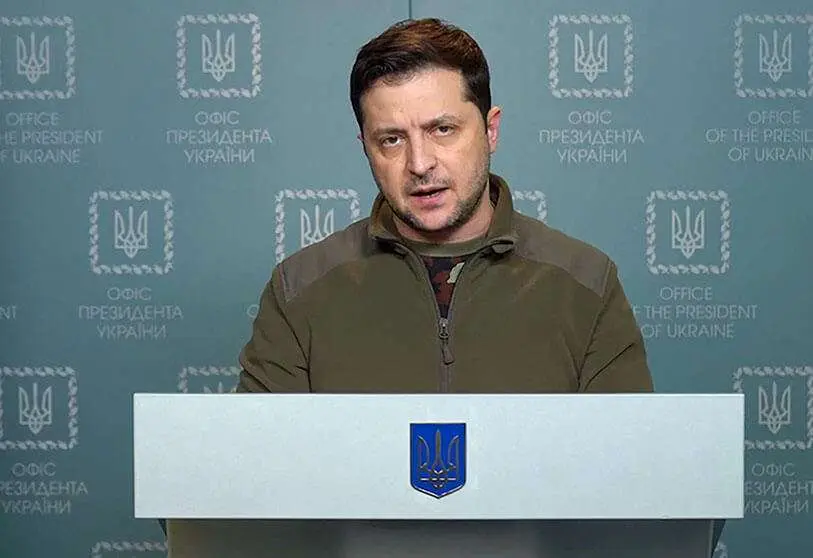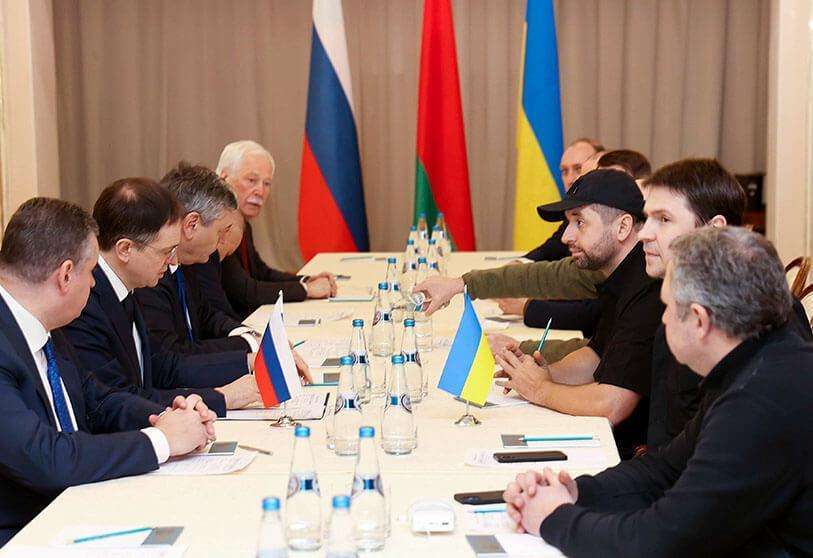Zelenski offers Putin a face to face: "What are you afraid of?

Vladimir Putin is prepared to go all the way. This is what he told French President Emmanuel Macron during a telephone conversation, who is also committed to tightening the siege on the Russian economy and exhausting diplomatic channels to stop the invasion of Ukraine. The Russian and Ukrainian delegations met on Thursday in the Belarusian city of Brest, near the border with Poland, for their second meeting since the war began eight days ago.
According to Reuters, three hours of negotiations resulted in a minimal agreement at Ukraine's request for the establishment of a humanitarian corridor to allow the evacuation of the civilian population living on the fronts under attack and the establishment of a temporary ceasefire during the operation. They have agreed to meet again, but no date has yet been set.
But the negotiating table does not guarantee a truce, quite the contrary. The Russian military offensive is entering its eighth day and is intensifying in several parts of the country after the fall on Wednesday of Kherson, the first city of relevance, close to the Crimean peninsula, where the Russian army planted its flag after a siege and relentless bombardment of civilian targets. From there, Russian troops are expected to move on to Odessa on the Black Sea.
Russia has been massing several ships in the vicinity of the port, according to US intelligence, in a move that hints at plans to land and deploy a ground incursion capable of seizing Ukraine's third largest city and, more importantly, controlling the entire Ukrainian coastline. Although the stop before this objective would be the city of Mykolaiv, the administrative centre of the homonymous oblast, where attacks have already taken place.
????? #Ukraine La ciudad costera de Mariúpol es completamente rodeada por las fuerzas rusas y resiste a la artillería enemiga
— Atalayar (@Atalayar_) March 3, 2022
?️Los combates están dejando barrios residencias totalmente destruidos, tal y como se muestra en estas imágenes pic.twitter.com/p7sclKIgqI
The port city of Mariupol, located halfway between Crimea and Donbass, is another strategic point in the country. Its control would result in the establishment of a corridor linking the two points, which are controlled by Russian troops, thus encapsulating Ukrainian forces. The city is under siege and under continuous air strikes against civilians and infrastructure, and could fall into Russian hands in the coming hours.
But the most coveted piece remains the capital, Kiev, whose fall into Russian hands would be a turning point. However, the advance entered a lethargic phase three days ago due to the inability of Russian forces to prepare for the ground incursion into the city because of poor logistics. The 60-metre military convoy remains less than 30 kilometres away from Independence Square, where hundreds of thousands of people gathered eight years ago in the so-called Euromaidan.
The vicinity of the square where people clamoured for Ukraine's effective rapprochement with the European Union is now under indiscriminate air strikes by Vladimir Putin's army. But the Ukrainian resistance has managed to weave an effective defence strategy in the face of its weakness. Civilian barricades, local defence movements and regular troops are hampering the advance of Russian forces.
The mood in the Ukrainian ranks remains stable as the number of civilian casualties rises to 2,000 and the number of displaced persons to one million. President Volodymir Zelensky's leadership, among other factors, is a source of encouragement after an allegedly foiled plot to assassinate him. The president acknowledged on Thursday that he feared for his life, his family's and the survival of his homeland, but said he would not give up.
"We have nothing to lose except our own freedom and dignity," the Ukrainian president said. "If anyone thinks that, having overcome all this, we Ukrainians are frightened, broken or surrendered, they simply know nothing about us, about Ukraine". And he asked Putin for a face-to-face: "What are you afraid of?" asked Zelenski.

During his appearance he also criticised Russia's 'modus operandi' of "destroying cities and killing its people" and said that Ukraine continues to receive weapons from its partners, from "friendly countries". It guarantees its resistance while exhausting the path of dialogue by sending a delegation led by its defence minister, Oleksii Reznikov, to Brest, and demands that NATO close Ukraine's airspace.
The second round of talks has ended in Belarus after an unsuccessful first round in which little progress was made. But the positions seem immovable. Putin has again declared to the nation that he considers Russians and Ukrainians "one people". His goal of "denazifying" and "demilitarising" Ukraine, i.e. neutralising the country and bringing it back under Moscow's orbit, is unanswerable and does not seem to take Kiev's conditions into account.
If Ukraine does not renounce NATO membership, Russia will move forward at any cost. This was confirmed by sources in the Elysée after the conversation between Putin and Macron, in which the Russian president showed no intention of stopping the offensive and seemed determined to invade the entire country. A roadmap that could only be stopped with an agreement harmful to Ukraine.








